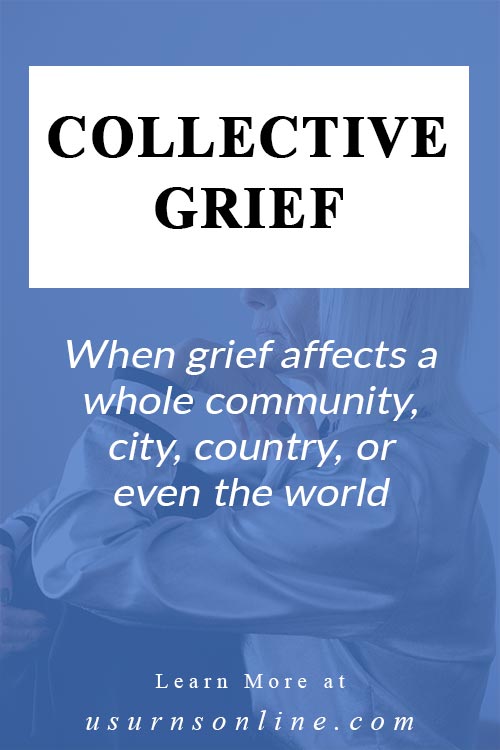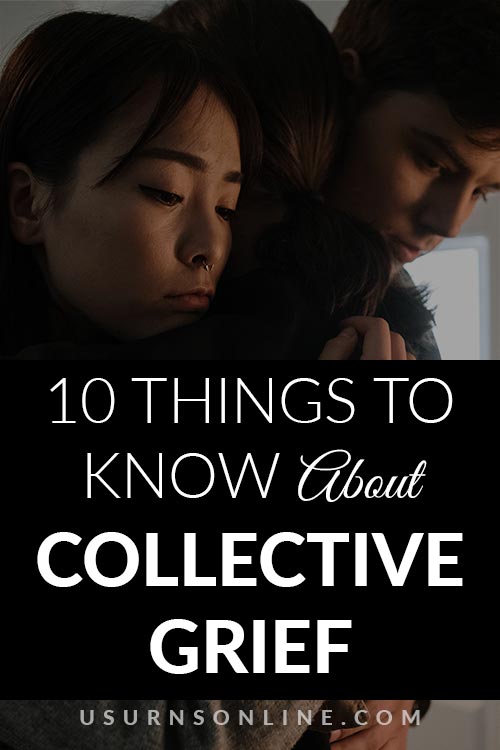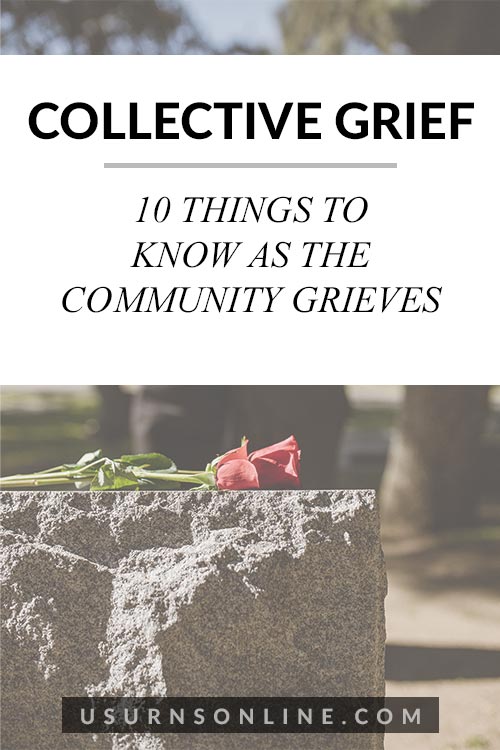What is collective grief, and what causes it? How – and why – do we grieve as a community, a country, or even the world?
I can think of a couple of significant events. COVID-19 and 9/11 come to mind. What about the bush fires in Australia, Hurricane Eta in Central America, and the flash floods in Afghanistan?
Some disasters happen on a smaller scale. Local communities can have a fire, flooding, community violence (school shooting), or even a terrible storm (Hurricane Katrina).
Is your community equipped to help the grieving? Where do you go, and what do you do when there is collective grief?
Read on and learn how to cope with what is going on in our world today.
What is Collective Grief?

Collective grief occurs when a community, society, town, city, nation, or the whole world collectively experience extreme change or loss.
Grief is a normal response to anger, loss, and violence. When the trauma affects an entire community, it is known as communal or collective grief.
Is there a difference between collective grief, community grief, and communal grief?
Communal grief refers to the experience of belonging to and sharing with a group of people that are also grieving. Collective grief encompasses a community. Community grief refers to the community grieving together.
Community grief, communal grief, and collective grief are essentially interchangeable.
Communal grief has been practiced for centuries. It isn’t a new concept, but we are recognizing more communal grief today due to the worldwide effects of COVID-19 pandemic.
Urns Made in the USA
What causes collective grief?
This type of grief happens in the aftermath of powerful events like war, natural disasters, or something that can result in mass casualties or widespread tragedy.
In my opinion, school shootings are the worst. The most lasting and haunting grief is the loss of a child. As parents, we send our children to school, which is and should be a safe place. But in a tragedy such as this, they don’t come home. Nothing could be worse.
The way the community responds to events like this is called collective grief.
What are some ways that communities can mourn?
- Public funerals and memorials
- Town hall meetings and public forums
- Protests and rallies
- Parades and processionals
- A moment of silence or prayer (e.g., the two-minute silence on Remembrance Day for World War I)
- Social media posts and groups
- Grief therapy offered by the city, counseling centers, churches, and other groups
- Donations to help those most affected
- Volunteer days for rebuilding, cleanup, etc.
When grief encompasses a community, we should encourage everyone to gather together. People gathering in one place will help them to grieve with one another. Share their heartaches, hopes, and fears. Community-wide tragedies will usually require additional grief support for weeks, months, or even years after the event.
Communities can mourn together on social media. Posting on Facebook and other platforms is a way to let people know what is happening and how you feel or even cope, while letting them respond in support and affirmation.
You can donate to a “Go Fund Me” account to come to the aid of families in need. When tragedy strikes, there are plenty of families that need assistance. Take someone under your wing.
Collective grief & COVID-19
History books will remember 2020 and following for the COVID-19 pandemic. For those going through it, it’s not just the loss of life we grieve (though that is huge for those impacted); for the wider community, it’s the loss of our “normal” lives.
David Kessler, the world’s leading authority on grief, says that in communal experiences like this we must acknowledge our grief.
We are feeling a loss of safety. You may have anticipatory grief because you don’t know what the future holds. We do know that it is going to be different.
Mr. Kessler has excellent insight and advice:
“Acceptance, as you might imagine, is where the power lies. We find control in acceptance. I can wash my hands. I can keep a safe distance. I can learn how to work virtually.“
As the pandemic plays out, we are learning a new normal. Our gatherings are much smaller now. We grieve “virtually” for funerals. Our loved ones can’t be physically comforted as before. We must give comfort through phone calls and text messages.
But we are resilient, and we will make our way through this and come out on the other side stronger! Hopefully, we will all be more mindful of other people’s needs.
10 Things to Know About Collective Grief
Collective grief is not new, but many people are experiencing it for the first time during the pandemic.
Here are some things you might find helpful. While these comments are written with the coronavirus lockdowns in mind, each tip can be applied to other situations of collective grief.
This might include the death of a colleague, community role model, or celebrity; a different national or localized tragedy, and more.
1. For those who have not suffered a personal loss, do they still feel grief over the pandemic?
Yes, even if you are one of the lucky ones that haven’t lost a loved one or your livelihood during the pandemic, you can still feel grief and stress.
Even if you haven’t been affected directly, you can feel mental pressure. You will still grieve other people’s losses. Empathy is a wonderful trait to have.
2. It is important to honor the ones who have died.
Take the time to honor not just your loved one but all loved ones who have passed in a mass tragedy.
I think back to 9/11. The United States was truly united. We were all heartbroken. The whole country was devastated over everyone’s loss. That is how a nation grieves. Those of us who weren’t touched by this tragedy felt the deep grief of those that lost loved ones.
3. “We are all dealing with the collective loss of the world we knew,” says David Kessler.
We have lost so many things in 2020 and beyond.
- Weddings
- Funerals
- Concerts
- Travel Plans
- School Events
- Jobs
- A sense of normalcy and continuity
We are all trying to adjust and plan for the future. It’s not easy. We are grieving for our everyday lives and needing to get back to them.
4. You may experience lack of closure.
With all of the restrictions on public gatherings, funerals have changed. You can’t attend in person due to the new guidelines.
Following via live feed is not quite the same. You don’t get that “physical” closure; you can’t touch your friend that has passed. It feels like you don’t get that final “goodbye.”
5. Communal grief and the pandemic.
We have all lost something in the pandemic. A job, social interaction, schooling, or even just going out to eat. The thing about grief is it doesn’t have to involve a death. You can grieve over the loss of anything that you hold dear.
6. How does communal grief help?
Sobonfu Some is one of the best-known voices of African spirituality.
Here is a quote from her blog post Embracing Grief:
“Communal grieving offers something that we cannot get when we grieve by ourselves. Through acknowledgment, validation, and witnessing, communal grieving allows us to experience a level of healing that is deeply and profoundly freeing.”
It is healthy for us to grieve together. Share the burden.
7. Public mourning is an important expression of community grief.
Gather together. Mourn together. Heal together. Gathering collectively to mourn and grieve publicly helps to reestablish community ties to one another.
There is healing power in fellowship. When you see your community is united in healing, it can help you heal from the loss.
8. Get involved.
Getting involved in your community can help the collective grieving process. Join a local club that is geared to strengthening your community. Inspire your friends and family to become involved too.
Help out at a soup kitchen. Deliver meals to the elderly. Become a “Big Brother” or “Big Sister.” As you work on your healing, you are also helping the community heal.
9. Grief can be both communal and personal.
Grief is a personal journey and can be lonely, but it connects us. We all grieve at some point.
We were all born knowing how to grieve. As children, we cried, and we felt better. Somewhere in growing up, we lost that ability to let go of our emotions. We need to get back to that simplicity.
There is no set time for how long grief will last. This is true at a personal level and a communal level. You have to let it run its course. Some people will never completely recover from their grief. You may not understand the depth of someone else’s pain. Still, it is always best to be kind and supportive.
Remember that grief takes the time it takes. You can’t rush it.
10. Collective grief involves giving and receiving.
One of the best attributes of collective grieving is that you give of yourself and receive from others. You give and receive empathy, affirmation, love, and respect.
You will learn how to keep going and coping with the situations that life has given you.
Collective Grief Quotes
Let’s close with some words of wisdom from leader, writers, and thinkers in various communities.
- “Grief is in two parts. The first is loss. The second is the remaking of life.” -Anne Roiphe
- “Every night when I go to bed, I hope that I may never wake again, and every morning renews my grief.” -Franz Schubert
- “These so-called bleak times are necessary to go through in order to get to a much, much better place.” -David Lynch
- “We can get through this together, as long as we stay kind.” -Abbie McKoy
- “If we learn nothing else from this tragedy, we learn that life is short and there is no time for hate.” -Sandy Dahl, wife of Flight 93 pilot Jason Dahl
- “You can be sure that the American spirit will prevail over this tragedy.” -Colin Powell
- “What separates us from the animals, what separates us from the chaos, is our ability to mourn people we’ve never met.” -David Levithan
- “Americans never quit.” -General Douglas MacArthur
- “Be safe, be smart, be kind.” -Dr. Tedros Adhanom Ghebreyesus, WHO Director-General
- “I understand that it’s hard for everyone, but one cannot give in to emotions… we’ll have to draw lessons from the current crisis, and now we’ll have to work on overcoming it.” -Boris Yeltsin
Communal grief is a pathway to healing. Embrace your fellow man and heal together. Remember, positive expressions of grief help us to move forward and heal.
Read Next: What Does Grief Do To The Body?






I try to enjoy society
But can’t and don’t enjoy it as much as I used to.
The world outside seems so uncertain and so unkind.
Hard for me to trust in many of people
Neighbors
Workers of certain agencies
Strangers
I don’t even trust local law enforcement
My mind goes back to a certain place in time.
Like a Cher song
If I can turn back time.
I remember my son Jesse Ryan-Riley Fleck as forever young
Forever Young
Rod Stewart
I don’t have trust in media
Nor medical professionals
I have been
Dumped
Abandoned
Alone
Scared of certain things in life
Scared of neighbors
Many of things frighten me
Such as noise
Loud music
Fights
Guns
Violence
Constant ringing in my ears
Sucks to be me
I never got to say my final goodbyes
Nor do I get to greet my son face to face
Yes it feels like death inside
I don’t find much things amusing any more.
Not much interest
Like all hope is lost.
I keep trying to search for my son in so many faces
I wish that I can hug my son
Shake his hand
High five
Fist bump
Sincerely J
💕💝❤🙏❤💝💕
I try to enjoy society
But can’t and don’t enjoy it as much as I used to.
The world outside seems so uncertain and so unkind.
Hard for me to trust in many of people
Neighbors
Workers of certain agencies
Strangers
I don’t even trust local law enforcement
My mind goes back to a certain place in time.
Like a Cher song
If I can turn back time.
I remember my son Jesse Ryan-Riley Fleck as forever young
Forever Young
Rod Stewart
I don’t have trust in media
Nor medical professionals
I have been
Dumped
Abandoned
Alone
Scared of certain things in life
Scared of neighbors
Many of things frighten me
Such as noise
Loud music
Fights
Guns
Violence
Constant ringing in my ears
Sucks to be me
I never got to say my final goodbyes
Nor do I get to greet my son face to face
Yes it feels like death inside
I don’t find much things amusing any more.
Not much interest
Like all hope is lost.
I keep trying to search for my son in so many faces
I wish that I can hug my son
Shake his hand
High five
Fist bump
Sincerely J
💕💝❤🙏❤💝💕